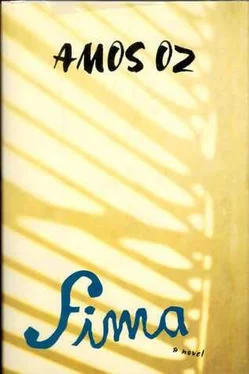When Yael wrote to him from Seatde early in 1966 to say there was another man in her life, Fima laughed at the trite expression. The love affairs of his billy-goat year, his marriage to Yael, Yael herself, now seemed as trite, as overacted, as childish as the underground revolutionary cell he had tried to set up when he was in high school. He decided to write her a line or two simply to send his best wishes to her and the other man in her life. He sat down at his desk that afternoon, and did not stop writing until midday the following day: in a feverish missive of thirty-four pages he confessed the depth of his love for her. After reading it through, he rejected it, tore it up, and flushed it down the toilet. You cannot describe love in words, and if you can, that's a sign the love no longer exists. Or is on the way out. Finally he tore a page of graph paper from a notebook and scrawled on it: "I can't stop loving you because it's not up to me, but of course you're a free agent. How blind I've been. If there's anything you need from the flat, let me know and I'll send it. Meanwhile I'm sending you a parcel with three of your nighties and your furry slippers and the photos. But if you don't mind, I'd like to keep the picture of the two of us at Bethlehem in Galilee." Yael took this letter to mean that Fima would not place any obstacles in the way of a divorce. But when she came back to Jerusalem and introduced a colorless, inexpressive man with a jaw that was too broad and thick eyebrows like a pair of bushy mustaches, saying, Efraim Nisan, Ted Tobias, let's all be friends, Fima changed his mind and adamantly refused to grant a divorce. So Ted and Yael flew back to Seattle. They lost contact, apart from a few aerograms and postcards about practical matters.
Early in 1982 Ted and Yacl turned up at Fima's flat one winter afternoon with their three-year-old son, a slightly cross-eyed albino child-philosopher with thick glasses, dressed in an American astronaut's space suit bearing a shiny metal badge inscribed with the word CHALLENGER. The little fellow soon revealed an ability to compose complicated conditional sentences and to duck awkward questions. Fima instantly fell for little Dimi Tobias. Regretting his earlier opposition, he offered Yael and Ted a divorce, his assistance, and his friendship. Yael, however, no longer attached any importance to the religious divorce and saw no point in friendship. In the intervening years she had managed to leave Ted twice and have affairs with other men before making up her mind to go back to him and to have Dimi at what was almost the last moment as far as she was concerned. Fima won the heart of the thoughtful little Challenger with a story about a wild wolf who decided to give up being wild and tried to join a colony of rabbits. When the story was over, Dimi offered his own ending, which Fima found logical, sensitive, and not unfunny.
Thanks to the intervention of Fima's father, the divorce was arranged discreetly. Ted and Yael settled in the suburb of Beit Hakerem, found jobs together in a research institute, and divided their year into three: the summer in Seattle, the fall in Pasadena, the winter and spring in Jerusalem. Sometimes they invited Fima on Friday evening, when the Kropotkins and the Gefens and the rest of the group were there. Sometimes they left Dimi with Fima in Kiryat Yovel and went off to Elat or Upper Galilee for a couple of days. Fima became their unpaid baby sitter, because he was available and because a friendship had grown up between him and Dimi. By some odd logic Dimi called him Granpa. He called Fima's father Granpa too. Fima taught himself to make houses, palaces, and castles with loopholes out of matchsticks, matchboxes, and glue. This was totally at odds with the image of Fima shared by his friends, by Yael, and by Fima himself, namely, a clumsy oaf who was born with two left hands and could never get the hang of replacing a faucet's washer or sewing on a button.
Apart from Dimi and his parents, there was the group: pleasant, respectable people, some of whom had known Fima from student days and had been indirectly involved in the ordeals of the billy-goat year, and some of whom still hoped that one day the fellow would wake up, get his act together, and one way or another take Jerusalem by the ears. True, they said, he sometimes gets on your nerves, he overdoes it, he has no sense of proportion, but on the other hand when he's brilliant he's really brilliant. One day he's really going to get somewhere. He's worth investing in. Last Friday, for example, early in the evening, before he started making a fool of himself with his imitations of politicians, the way he snatched the word "ritual" out of Tsvi's mouth and held us all spellbound like little kids when he suddenly said, "Everything is ritual," and fired his theory at us straight from the hip. We haven't stopped talking about it all week. Or that amazing comparison he threw out, of Kafka and Gogol, and of the two of them with Hasidic folk tales.
Over the years some of them grew fond of Fima's unique combination of wit and absent-mindedness, of melancholy and enthusiasm, of sensitivity and helplessness, of profundity and buffoonery. Moreover, he was always available to be roped in to do some proofreading or to discuss a draft of an article. Behind his back they said, not unkindly, True, he's a — how to put it? — he's an original, and he's goodhearted. The trouble is, he's bone idle. He has no ambition. He simply doesn't think about tomorrow. And he's not getting any younger.
Despite which, there was something in his pudgy form, his shuffling, abstracted way of walking, his fine, high brow, his weary shoulders, his thinning fair hair, and his kindly eyes that always seemed lost and looking cither inward or out beyond the mountains and the desert, something in his appearance that filled them with affection and joy and made them smile broadly even when they caught sight of him from a distance, on the other side of the street, wandering around the city center as though he did not know who had brought him there or how he was going to get out again. And they said: Look, there's Fima over there, waving his arms. He must be having an argument with himself, and presumably he's winning it.
In the course of time a certain uneasy friendliness, filled with anger and contradictions, developed between Fima and his father, the well-known cosmetics manufacturer Baruch Nomberg, who was a veteran member of the right-wing Herut party. Even now, when Fima was fifty-four and his father eighty-two, the father would slip a couple of ten-shekel notes, or a single twenty-shekel note, into his son's pocket at the end of every visit. Meanwhile Fima's little secret was that he deposited eighty shekels each month in a savings account in the name of Ted and Yael's son, who was ten now but still looked like a seven-year-old, dreamy and trustful. Strangers on buses sometimes noticed a vague resemblance between Fima and the child, in the shape of the chin or the forehead, or in the walk. The previous spring Dimi had asked to keep a pair of tortoises and some silkworms in a little storage space that Fima and Ted cleared for him on the balcony of the messy kitchen of the flat in Kiryat Yovel. And even though Fima was considered by others and even by himself as incorrigibly idle and absent-minded, all through the summer there was not a single day when he forgot to attend to what he took to calling "our can of worms." Now, in the winter, the silkworms were dead, and the tortoises had been set free in the wadi, at the point where Jerusalem abruptly ends and a rocky wilderness begins.
4. HOPES OF OPENING A NEW CHAPTER
THE PRIVATE CLINIC IN KIRYAT SHMUEL WAS APPROACHED through the garden behind the building, along a pathway paved with Jerusalem stone. Now that it was winter, the path was covered with slippery rain-soaked pine needles. Fima was totally absorbed in considering whether a frozen bird he had just spotted on a low branch could hear the thunder that was rolling from west to east; the bird's head and beak were buried deep in the plumage of its wing. Struck by a sudden doubt, he turned back to see if it really was a bird or if it was just a wet pine cone. That was how he came to slip and fall to his knees. He stayed crouching, not because he was in pain, but because of self-mocking pleasure at his own predicament. Softly he said, Well done, pal.
Читать дальше












